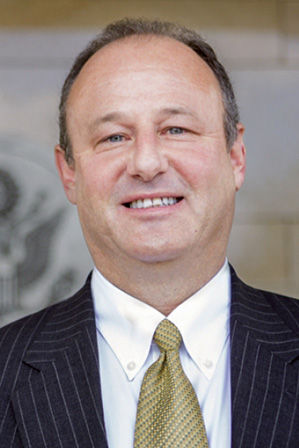More Diplomacy, Now
President’s Views
BY ERIC RUBIN

(a)The Congress finds that—(1) a career foreign service, characterized by excellence and professionalism, is essential in the national interest to assist the President and the Secretary of State in conducting the foreign affairs of the United States; ...
That is the opening statement of the U.S. Foreign Service Act of 1980, our foundational legislation, and a testament to the power of bipartisan action to advance our national interest—something we see all too rarely these days.
The challenges that our country and the world are now up against are the most dramatic and consequential since the end of the Cold War. As diplomats and development professionals, we have the opportunity and, when we can, the obligation to contribute to efforts to respond to these challenges and to help shape the future direction of our world.
This issue of the FSJ includes a collection of superb essays on the new realities we face in 2022 in the wake of Russia’s renewed invasion of Ukraine and the related horrors and war crimes. The authors—Bill Taylor, Rose Gottemoeller, Michael Lally, and Ken Moskowitz—highlight the factors that led to the current crisis and the stark choices facing the United States and the world. Thankfully, support for Ukraine has, so far, been bipartisan.
The return of war to the heart of Europe is occurring at the same time we are met with an increasingly aggressive China and ongoing global crises in energy, climate, health, and food security.
Our country needs the wisdom, experience, and judgment that only a career, professional diplomatic service can provide. AFSA will continue pushing hard for action to fill all remaining Senate-confirmed diplomatic and policy positions (a shocking number are still vacant), for the Senate to confirm all pending career and political nominations to diplomatic positions before the end of the current session, and for Congress and the administration to commit to increased funding and overseas staffing for every foreign affairs agency.
We applaud the Biden administration’s decision to reverse the shortsighted actions of previous administrations to close embassies in “small countries” and believe that reinvigorating President John F. Kennedy’s vision of universal representation, with a U.S. embassy in nearly every national capital, is both essential and affordable.
Those of us who have devoted much of our careers to building a positive and constructive relationship with Russia can only find this time to be wrenching and dismaying. An era has ended with the passing of Mikhail Gorbachev. As the authors in this issue of the Journal emphasize, we as a service and a profession have an indispensable role to play in navigating this difficult time.
Our colleagues across the globe are doing just that. In Kyiv, the core team that returned to reopen our embassy is living under the daily threat of missile and rocket attacks, working day by day to reestablish our presence and support Ukraine in its hour of need.
In Moscow, our colleagues are living and working under the most hostile and difficult conditions since the end of the Cold War. They are keeping the American flag flying while working to help imprisoned Americans, prevent further escalation, and keep diplomatic channels open at a time when those channels are more constricted and restricted than they have been since the days of Stalin.
America needs diplomacy now. And diplomacy needs a strong, healthy, motivated, and respected corps of professionals. May we be worthy of this moment, and may we get the support and resources we need to do the job we want to do for our country and the American people.
 §
§
As I write this column, I have just learned the terrible news of the death of our friend and colleague Sarah Langenkamp in a bicycle accident in Bethesda, Maryland. Only a few weeks before, our colleagues Shawn O’Donnell and Timothy Fingarson also died in heartbreaking, tragic traffic accidents, in Foggy Bottom. Our thoughts and heartfelt sympathy are with their families and with all of those who knew and loved them.

